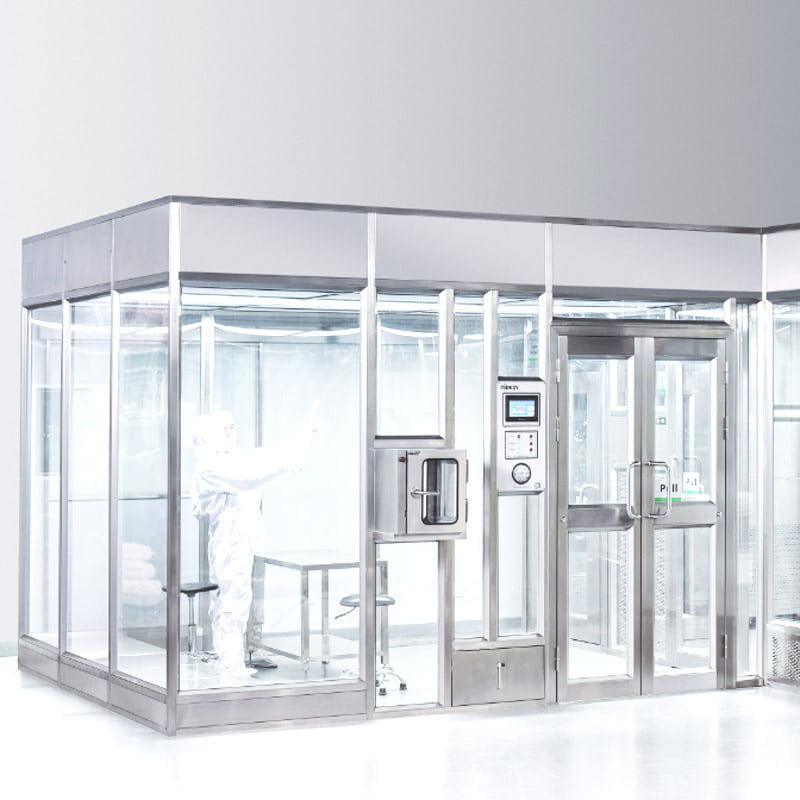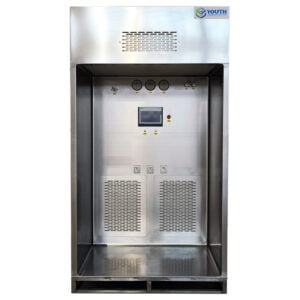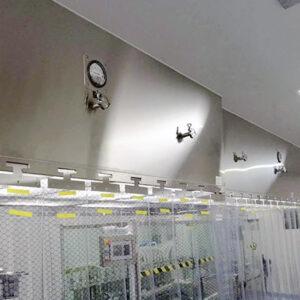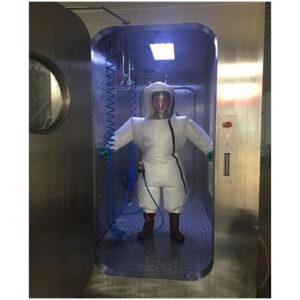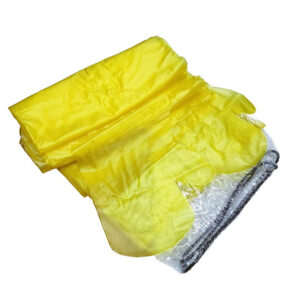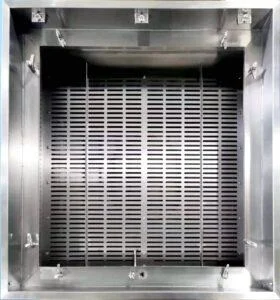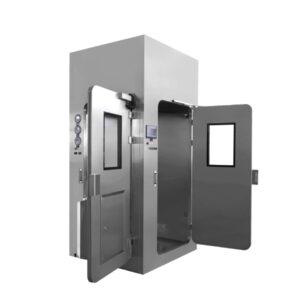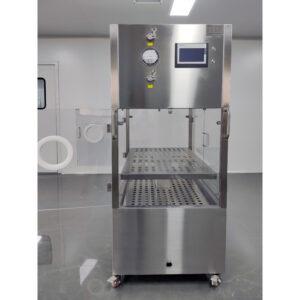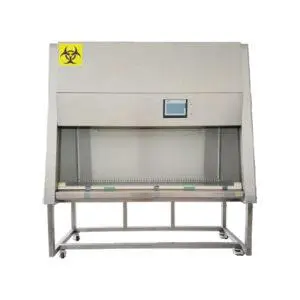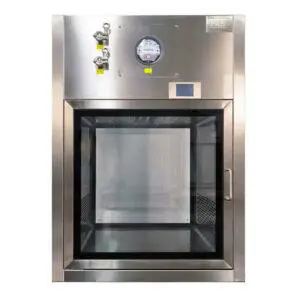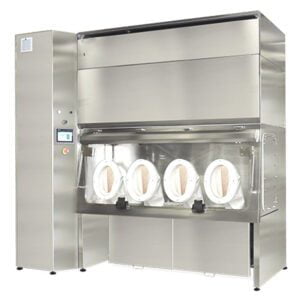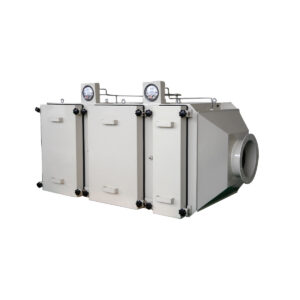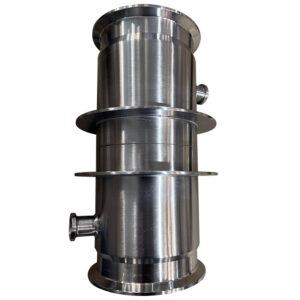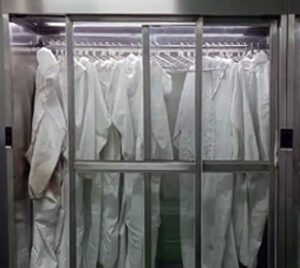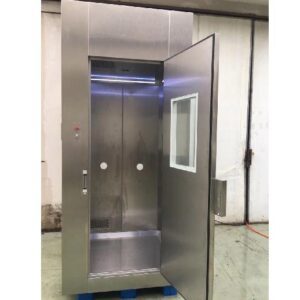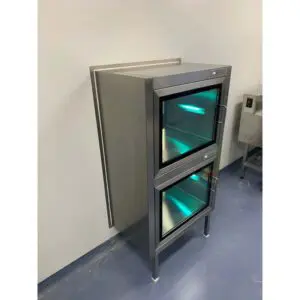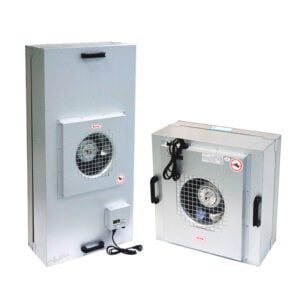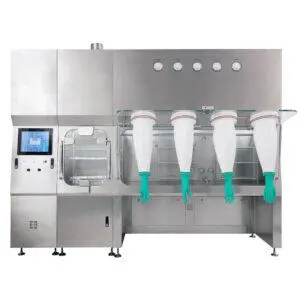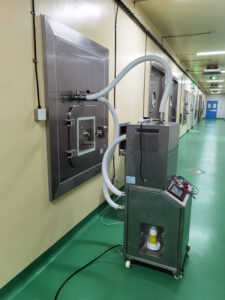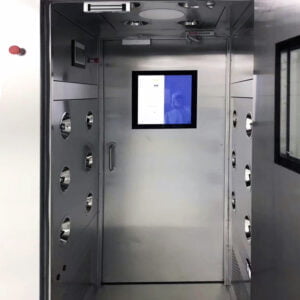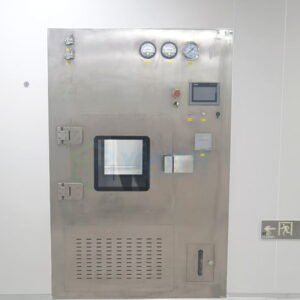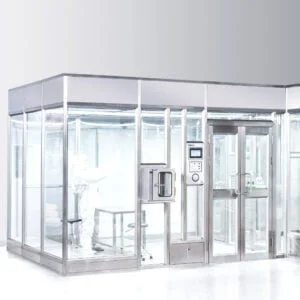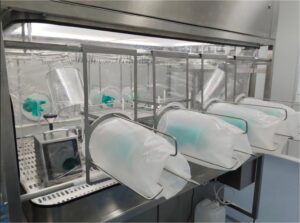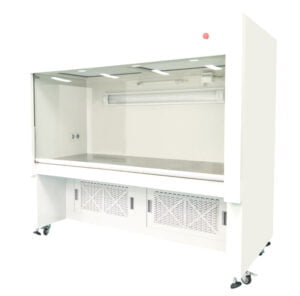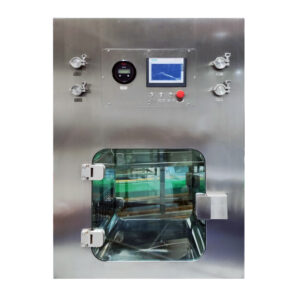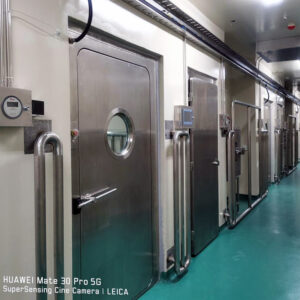What is a Modular Cleanroom?
A modular cleanroom is a prefabricated cleanroom that is composed of standardized components or modules. These modules can be easily assembled and disassembled, allowing the cleanroom to be easily relocated or reconfigured. Modular cleanrooms are commonly used in industries such as pharmaceuticals, biotechnology, and semiconductor manufacturing, where maintaining a controlled environment is critical. Modular cleanrooms are typically designed to meet specific cleanliness and contamination control requirements, and they can be customized to meet the needs of a particular application. Some key features of modular cleanrooms include air filtration systems, HEPA filters, and environmental monitoring systems.
A modular clean booth is a type of cleanroom that is compact and customized to meet the specific needs of the user. It is easy to disassemble and reassemble, making it cost-effective for installation and shipping. The cleanliness level of a modular clean booth can range from Class 100 to Class 100,000, effectively separating people and machinery or goods and reducing human involvement and contamination. They are prefabricated in a factory and can be easily installed in a single day.
Components of a Modular Cleanroom
Walls and Panels: The walls and panels of a modular cleanroom are constructed using high-quality materials such as steel or aluminum, ensuring stability, durability, and airtightness. These panels can be pre-engineered for quick and efficient installation.
Ceiling Systems: Ceiling systems in modular cleanrooms offer integrated solutions for lighting, filtration, and HVAC. They can accommodate various types of lighting fixtures, air diffusers, and HEPA filters to ensure proper air circulation and cleanliness.
Flooring Options: Different industries require different types of flooring in their cleanrooms. Options include epoxy flooring, vinyl, or raised access flooring, each offering specific advantages such as chemical resistance, durability, and ease of cleaning.
Doors and Windows: Cleanroom doors and windows are designed to maintain the integrity of the controlled environment while allowing for easy access and visibility. They are made of materials like stainless steel or glass, ensuring durability and smooth operation.
Air Filtration Systems: Cleanroom air filtration systems are crucial for removing particulate matter and maintaining air quality. HEPA (High-Efficiency Particulate Air) filters effectively capture particles as small as 0.3 micrometers, ensuring clean and contaminant-free air within the cleanroom.
Lighting Fixtures: Proper illumination is essential in a cleanroom environment. LED lighting fixtures are commonly used as they provide bright, energy-efficient lighting that minimizes heat generation and reduces the risk of particle contamination.
HVAC Systems: Heating, ventilation, and air conditioning (HVAC) systems are critical for maintaining temperature, humidity, and air circulation within the cleanroom. These systems ensure a stable and controlled environment, which is essential for sensitive processes.
Monitoring and Control Systems: Cleanrooms require continuous monitoring and control to ensure compliance with cleanliness standards. Advanced monitoring systems, such as particle counters, temperature and humidity sensors, and pressure differentials, provide real-time data and enable prompt adjustments if deviations occur.
Furniture and Accessories: Cleanroom furniture and accessories are designed to meet the specific requirements of the industry. They are made from non-shedding, easy-to-clean materials and include workstations, storage cabinets, garment dispensers, and pass-through chambers.
Advantages of Modular Cleanrooms
Modular cleanrooms offer numerous advantages over traditional construction methods, making them a preferred choice for many industries:
Flexibility and Scalability: Modular cleanrooms can be easily expanded, reconfigured, or relocated as per changing requirements. This flexibility allows businesses to adapt to evolving needs without significant disruption to ongoing operations.
Cost-Effectiveness: Compared to conventional cleanrooms, modular cleanrooms offer cost savings in terms of construction, maintenance, and operational expenses. The modular components are pre-engineered, reducing construction time and labor costs.
Quick Installation and Setup: Modular cleanrooms can be installed and operational in a fraction of the time required for traditional cleanrooms. The pre-fabricated components are delivered to the site and assembled with precision, minimizing downtime and accelerating time-to-market.
Compliance with Industry Standards: Modular cleanrooms are designed to meet industry-specific standards, such as ISO, FDA, or GMP requirements. They ensure adherence to strict cleanliness, temperature, humidity, and air quality regulations, providing a controlled environment for critical processes.
Ease of Maintenance and Cleaning: Modular cleanrooms are constructed using materials that are easy to clean and maintain. The smooth surfaces and seamless joints reduce the risk of particle accumulation, simplifying cleaning procedures and minimizing downtime.
Applications of Modular Cleanrooms
Modular cleanrooms find applications in a wide range of industries where cleanliness and contamination control are paramount:
Pharmaceutical and Biotechnology Industries: Cleanrooms are vital for pharmaceutical manufacturing, research laboratories, and biotechnology facilities. They provide a sterile environment for drug formulation, compounding, and aseptic processing.
Electronics and Semiconductor Manufacturing: The electronics industry relies on cleanrooms for manufacturing microchips, semiconductors, and electronic components. Cleanrooms prevent contamination that can compromise the functionality and performance of sensitive electronic devices.
Medical Device Production: Cleanrooms ensure the cleanliness and integrity of medical devices during manufacturing, assembly, and packaging processes. They minimize the risk of microbial contamination and ensure product safety and reliability.
Aerospace and Defense: Cleanrooms play a crucial role in aerospace and defense industries, particularly in satellite production, assembly of precision instruments, and the manufacture of aircraft components. They prevent the ingress of foreign particles that can impact performance and safety.
Research and Development Laboratories: Cleanrooms are essential for research and development activities in various fields, including nanotechnology, material science, and biotechnology. They provide a controlled environment for conducting experiments and developing innovative solutions.
Customization Options for Modular Cleanrooms
YOUTH offers a range of customization options to tailor modular cleanrooms to specific needs:
Size and Layout: Modular cleanrooms can be customized to fit available space, whether it’s a small laboratory or a large-scale manufacturing facility. The layout can be optimized for workflow efficiency and compliance with industry regulations.
Cleanliness Classification: Cleanrooms are classified based on the maximum allowable particle count per cubic meter of air. YOUTH provides cleanrooms ranging from ISO Class 1 to ISO Class 9, allowing customers to choose the appropriate cleanliness level based on their specific requirements.
Material Selection: YOUTH offers a variety of materials for cleanroom construction, including high-quality steel, aluminum, and specialized cleanroom panels. These materials ensure durability, stability, and the ability to maintain a controlled environment.
Additional Features and Requirements: YOUTH understands that different industries may have unique needs. Therefore, they provide options for additional features such as gowning areas, airlocks, pass-through chambers, and specialized equipment integration to meet specific cleanroom requirements.
Choosing a Reliable Modular Cleanroom Provider
When selecting a modular cleanroom provider, it’s essential to consider the following factors:
Experience and Expertise: Look for a provider with a proven track record in designing and delivering modular cleanrooms across different industries. Experience demonstrates their understanding of industry-specific challenges and the ability to provide tailored solutions.
Quality and Certifications: Ensure that the cleanroom provider adheres to international quality standards and holds relevant certifications. This guarantees that the cleanrooms meet the required specifications and comply with industry regulations.
Customer Support and After-Sales Service: A reliable cleanroom provider should offer excellent customer support throughout the project, from initial design to installation and beyond. They should provide ongoing maintenance services, repairs, and responsive assistance whenever needed.
FAQs:
What industries benefit from modular cleanrooms?
Modular cleanrooms are beneficial for a wide range of industries, including pharmaceuticals, biotechnology, electronics, aerospace, defense, and research laboratories.
How are modular cleanrooms different from traditional cleanrooms?
Modular cleanrooms offer flexibility and scalability, quick installation, and cost-effectiveness compared to traditional cleanrooms. They can be easily expanded, reconfigured, and relocated to adapt to changing needs.
Can modular cleanrooms comply with industry standards?
Yes, modular cleanrooms can be designed to meet industry-specific standards such as ISO, FDA, or GMP requirements. They ensure compliance with cleanliness, temperature, humidity, and air quality regulations.
Are modular cleanrooms easy to maintain and clean?
Yes, modular cleanrooms are constructed using materials that are easy to clean and maintain. The smooth surfaces and seamless joints minimize the risk of particle accumulation, simplifying cleaning procedures.
Can modular cleanrooms be customized?
Yes, modular cleanrooms offer customization options such as size, layout, cleanliness classification, material selection, and additional features to meet specific industry needs.
How long does it take to install a modular cleanroom?
Modular cleanrooms can be installed and operational in a shorter time compared to traditional cleanrooms. The prefabricated components are delivered to the site and assembled efficiently, reducing downtime.
What advantages do modular cleanrooms offer in terms of cost?
Modular cleanrooms offer cost savings in terms of construction, maintenance, and operational expenses. The pre-engineered components reduce construction time and labor costs.
What are the benefits of a flexible cleanroom solution?
Flexibility allows businesses to adapt to evolving needs without significant disruption to ongoing operations. Modular cleanrooms can be easily expanded, reconfigured, or relocated as per changing requirements.
Can modular cleanrooms accommodate specialized equipment?
Yes, modular cleanrooms can be customized to accommodate specialized equipment integration based on industry requirements, ensuring seamless workflow and functionality.
How do modular cleanrooms ensure air quality?
Modular cleanrooms incorporate air filtration systems, such as HEPA filters, to remove particulate matter and maintain clean and contaminant-free air within a controlled environment.
Are there specific safety features in modular cleanrooms?
Modular cleanrooms can include safety features like gowning areas, airlocks, and pass-through chambers to minimize the risk of contamination and ensure the safety of personnel and products.
What level of customer support can be expected from a cleanroom provider?
A reliable cleanroom provider should offer excellent customer support throughout the project, including design, installation, and ongoing maintenance services. They should be responsive and provide assistance when needed.
How do I choose the right modular cleanroom provider?
When selecting a modular cleanroom provider, consider their experience, expertise, quality certifications, and reputation. Look for a provider that offers customized solutions and reliable customer support to meet your specific needs.
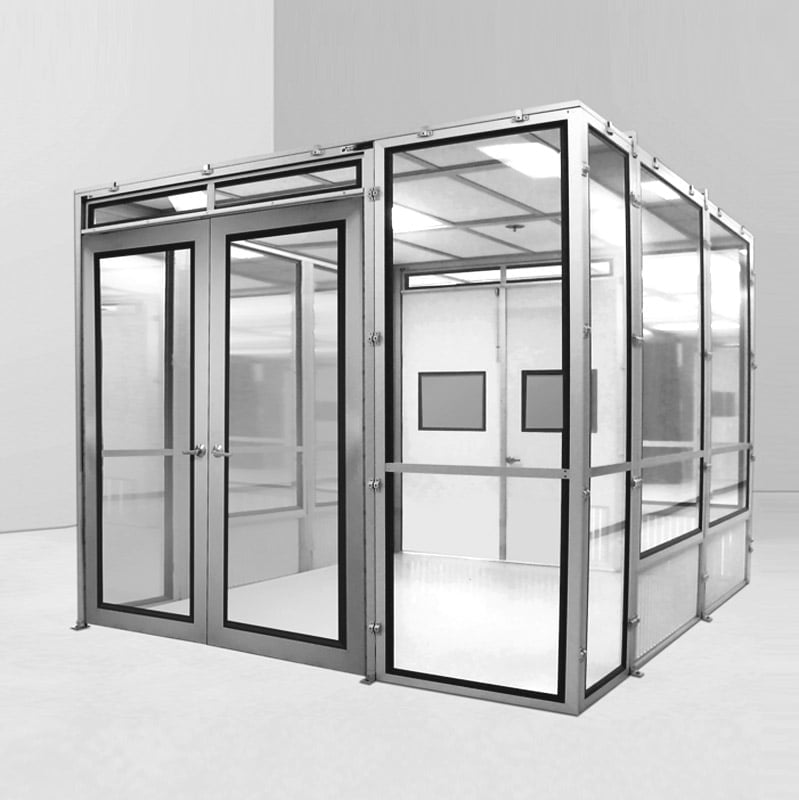
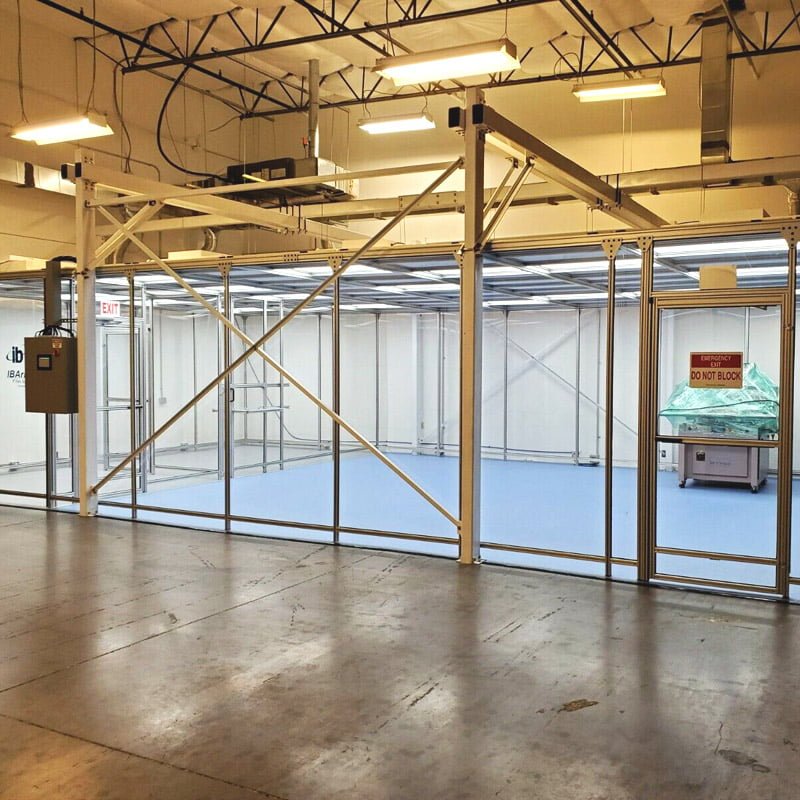
How to choose A modular clean room for your cleanroom projects?
There are a few key factors to consider when choosing a modular cleanroom for your cleanroom projects:
- Size and capacity: Determine the size of the space you need to enclose and the level of cleanliness required (e.g. ISO Class 5, 6, 7). This will help you determine the appropriate size and number of modular cleanroom units needed.
- Contamination control: Look for a modular cleanroom with strong contamination control capabilities, such as high-efficiency air filtration systems and positive pressure control.
- Ease of assembly and disassembly: Choose a modular cleanroom that is easy to assemble and disassemble, as this will make it easier to set up and take down as needed.
- Maintenance requirements: Consider the ease of maintenance and availability of replacement parts for the modular cleanroom you choose.
- Cost: Determine your budget and look for a modular cleanroom that fits within it, while still meeting your needs and requirements.
It may also be helpful to consult with a cleanroom specialist or manufacturer to discuss your specific needs and get recommendations for the best modular cleanroom for your project.
Related Contents:
- Biosafety Passboxes: Guardians of Cleanroom Integrity
- Customizing Biosafety Passboxes for Specific Industry Needs
- Safeguarding Sterility: BIBO Systems in Cross-Contamination Prevention
- Tailoring BIBO Systems: Industry-Specific Solutions
- The Cost-Effectiveness of BIBO Systems in Industrial Applications
- Laminar Flow Passboxes: Ensuring Continuous Air Purification
- Evaluating BIBO Systems’ Efficiency in Particle Removal
- Biosafety Passboxes: Guardians of Cleanroom Integrity
- Environmental Impact of BIBO Systems in Industrial Filtration

